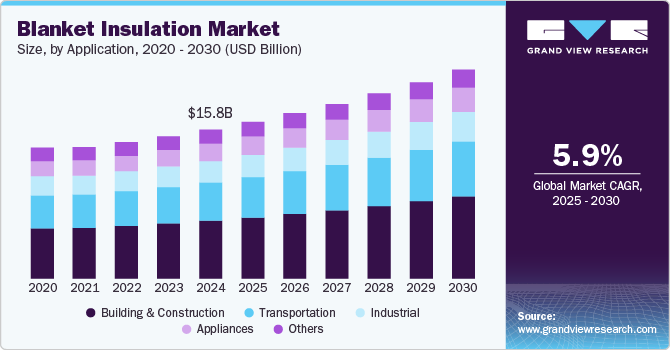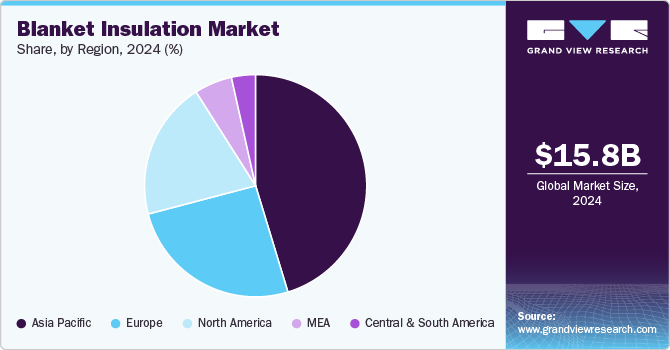- Home
- »
- Advanced Interior Materials
- »
-
Blanket Insulation Market Size, Share & Trends Report, 2030GVR Report cover
![Blanket Insulation Market Size, Share & Trends Report]()
Blanket Insulation Market (2025 - 2030) Size, Share & Trends Analysis Report By Application (Building & Construction, Transportation, Industrial, Appliances), By Region, And Segment Forecasts
- Report ID: GVR-4-68040-117-6
- Number of Report Pages: 100
- Format: PDF
- Historical Range: 2018 - 2023
- Forecast Period: 2025 - 2030
- Industry: Advanced Materials
- Report Summary
- Table of Contents
- Segmentation
- Methodology
- Download FREE Sample
-
Download Sample Report
Blanket Insulation Market Size & Trends
The global blanket insulation market size was estimated at USD 15.84 billion in 2024 and is projected to grow a CAGR of 5.9% from 2025 to 2030. This growth can be attributed to the increasing use of insulation in building & construction and industrial applications. Blanket insulation can also be utilized for acoustic fabrication in warehouses and other commercial buildings and thermal insulation in interior spaces. The construction industry is expected to reach about USD 14 trillion by the end of 2030 due to increasing urbanization and increased spending on housing and remodeling across the globe.

Urbanization and population growth have led to a surge in construction activities, fueling the demand for insulation materials. Blanket insulation products are widely used in new builds and renovations due to their ease of installation and versatility. As more developers prioritize energy-efficient building designs, the adoption of blanket insulation continues to rise, contributing to market expansion.
As energy costs continue escalating, homeowners and businesses increasingly seek solutions that minimize energy consumption. Blanket insulation, known for its thermal performance, helps reduce heating and cooling expenses, making it an attractive option for new constructions and retrofitting existing buildings. Innovations have led to the development of high-performance blanket insulation that offers better thermal resistance and improves soundproofing and fire resistance. Manufacturers are investing in research and development to enhance the properties of insulation materials, making them lighter, easier to install, and more environmentally friendly.
Application Insights
The building & construction segment accounted for the largest market revenue share of 39.5% in 2024. As global populations rise and urbanization accelerates, the demand for new housing and commercial properties intensifies. This surge in construction activities necessitates efficient thermal insulation solutions to enhance energy efficiency and ensure compliance with stringent building codes to reduce energy consumption. The integration of blanket insulation into building designs not only supports sustainability efforts but also meets consumer expectations for comfort and cost savings. The renovation and retrofitting of existing buildings present another opportunity for the blanket insulation market. Older buildings often lack adequate insulation, so there is a significant push to upgrade these structures to improve energy efficiency and comfort. Blanket insulation is particularly well-suited for such projects, as it can be easily integrated into walls, attics, and ceilings without extensive modifications.
The industrial segment is anticipated to grow at a CAGR of 6.4% over the forecast period. Effective thermal management in manufacturing, chemical processing, and power generation becomes critical as industries ramp up production to meet rising consumer demands. Blanket insulation helps maintain optimal temperatures in equipment and piping systems, ensuring efficient operations. This increased industrial output drives the demand for insulation materials and encourages manufacturers to innovate and develop more efficient products tailored for specific industrial applications.
In the transportation sector, these materials are used in vehicles ranging from automobiles to aircraft and marine vessels. As electric and hybrid cars gain popularity, the need for effective thermal management systems has become paramount. Blanket insulation protects batteries and electric components from extreme temperatures, ensuring optimal performance and longevity. Blanket insulation is widely used in various household appliances such as refrigerators, water heaters, and HVAC systems. The demand for energy-efficient appliances has surged as consumers seek to reduce their energy bills and minimize their environmental impact.
Regional Insights
The North American Blanket Insulation market is anticipated to grow significantly over the forecast period. There is a growing awareness among consumers and builders regarding sustainable building practices, propelling the blanket insulation market in the region. Many stakeholders are now prioritizing eco-friendly materials that contribute to energy savings over the lifecycle of a building. Blanket insulation options made from recycled or natural materials are gaining traction as they align with sustainability goals. This shift towards green building practices enhances energy efficiency and reduces environmental impact, thus attracting environmentally conscious consumers who prefer products that support sustainable living.
U.S. Blanket Insulation Market Trends
The U.S. Department of Energy (DOE) has established various standards that mandate higher insulation R-values in residential and commercial buildings. These regulations encourage builders and homeowners to invest in high-performance insulation products, including blanket insulation, known for its effectiveness in thermal resistance. According to data from the U.S. Census Bureau, new housing starts have been on an upward trend, leading to a corresponding rise in demand for insulation materials.
Asia Pacific Blanket Insulation Market Trends
The Asia Pacific blanket insulation market accounted for the largest market revenue share of 45.3% in 2024. Countries such as China and India are witnessing extensive infrastructure development, including residential, commercial, and industrial projects. This boom in construction is a primary driver for the blanket insulation market, as builders increasingly recognize the importance of energy efficiency and thermal comfort in buildings. Blanket insulation materials, such as fiberglass and mineral wool, are widely used in walls, roofs, and floors to enhance energy performance and reduce heating and cooling costs.

China Blanket Insulation Market Trends
China blanket insulation market is anticipated to grow at a CAGR of 6.3% over the forecast period. The Chinese government has implemented stringent regulations to improve energy efficiency in buildings. These regulations mandate high-performance insulation materials to reduce energy consumption for heating and cooling purposes. The “13th Five-Year Plan for Ecological and Environmental Protection” emphasizes energy-saving measures, which include enhancing building insulation standards. As a result, manufacturers are focusing on developing advanced blanket insulation products that meet these regulatory requirements.

Europe Blanket Insulation Market Trends
The European Union has set ambitious targets to reduce greenhouse gas emissions and improve energy efficiency across various sectors, including residential, commercial, and industrial buildings. These regulations often mandate higher insulation standards for new constructions and renovations, driving demand for effective insulation solutions like blanket insulation. As a result, manufacturers are focusing on developing high-performance blanket insulation products that meet or exceed these regulatory requirements.
Key Blanket Insulation Company Insights
Some of the key players operating in the market include Refmon, Apronor, Armacell, and others:
-
Refmon provides high-quality blanket insulation solutions to enhance energy efficiency and thermal performance across various applications. Refmon’s offerings include products tailored to meet specific needs, such as soundproofing, fire resistance, and moisture control. Their blanket insulation products are engineered to comply with industry standards and regulations, ensuring safety and effectiveness in reducing heat loss or gain.
-
Apronor product offerings include fiberglass, mineral wool, and foam insulation blankets engineered to meet the diverse needs of residential, commercial, and industrial sectors. These insulation materials are known for their excellent thermal resistance (R-value), sound absorption properties, and fire resistance capabilities. Apronor’s blanket insulation products are available in various thicknesses and densities to accommodate different installation requirements, ensuring optimal performance in various environments.
Key Blanket Insulation Companies:
The following are the leading companies in the blanket insulation market. These companies collectively hold the largest market share and dictate industry trends.
- Refmon
- Apronor
- Insul-fab
- Armacell
- Thermaxx jackets
- Ravani ceramics
- Hudson's bay company
- Urbanara gmbh
- American blanket company
- Medline industries Inc.
- Jarden corporation
- Pendleton woolen mills
- Chellco industries limited
- Biddeford blankets llc
- Shanghai easun group
Blanket Insulation Market Report Scope
Report Attribute
Details
Market size value in 2025
USD 16.66 billion
Revenue forecast in 2030
USD 22.19 billion
Growth rate
CAGR of 5.9% from 2025 to 2030
Base year for estimation
2024
Actual estimates/Historical data
2018 - 2023
Forecast period
2025 - 2030
Quantitative units
Revenue in USD million/billion, Volume in Kilotons, and CAGR from 2025 to 2030
Report coverage
Revenue forecast, company ranking, competitive landscape, growth factors, and trends
Regional Scope
North America; Europe; Asia Pacific; Central & South Africa; Middle East & Africa
Country scope
U.S.; Canada; Mexico; Germany; UK; France; Italy; Spain; China; India; Japan; South Korea; Australia.
Segments covered
Application, region
Key companies profiled
Refmon; Apronor; Insul-fab; Thermaxx jackets; Ravani ceramics; Hudson's bay company; Urbanara gmbh; American blanket company; Medline industries inc.; Armacell; Jarden corporation; Pendleton woolen mills; Chellco industries limited; Biddeford blankets llc; Shanghai easun group
Customization scope
Free report customization (equivalent up to 8 analysts working days) with purchase. Addition or alteration to country, regional & segment scope.
Pricing and purchase options
Avail customized purchase options to meet your exact research needs. Explore purchase options
Global Blanket Insulation Market Report Segmentation
This report forecasts revenue growth at regional & country levels and provides an analysis on the industry trends in each of the sub-segments from 2018 to 2030. For this study, Grand View Research has segmented the blanket insulation market based on application and region:

-
Application Outlook (Volume, Kilotons; Revenue, USD Million; 2018 - 2030)
-
Building & Construction
-
Transportation
-
Industrial
-
Appliances
-
Others
-
-
Region Outlook (Volume, Kilotons; Revenue, USD Million, 2018 - 2030)
-
North America
-
U.S.
-
Canada
-
Mexico
-
-
Europe
-
Germany
-
Italy
-
U.K.
-
France
-
Spain
-
-
Asia Pacific
-
China
-
Japan
-
India
-
South Korea
-
Australia
-
-
Central & South America
-
Middle East & Africa
-
Frequently Asked Questions About This Report
b. The global blanket insulation market size was estimated at USD 15.84 billion in 2024 and is expected to reach USD 16.66 billion in 2025.
b. The global blanket insulation market is expected to grow at a compound annual growth rate, a CAGR of 5.9% from 2025 to 2030, to reach USD 22.19 billion by 2030.
b. The building & construction segment of blanket insulation market accounted for the largest revenue share of 39.5% in 2024.
b. Some key players operating in the blanket insulation market include Refmon, Apronor, Insul-fab, Thermaxx jackets, Ravani ceramics, Hudson's bay company, Urbanara gmbh, American Blanket Company, Medline industries inc., Jarden corporation, Pendleton woolen mills, Chellco industries limited, Biddeford blankets llc, and Shanghai easun group.
b. Key factors that are driving the market growth include the rising demand of blanket insulation in construction & building and transportation application.
Share this report with your colleague or friend.
Need a Tailored Report?
Customize this report to your needs — add regions, segments, or data points, with 20% free customization.

ISO 9001:2015 & 27001:2022 Certified
We are GDPR and CCPA compliant! Your transaction & personal information is safe and secure. For more details, please read our privacy policy.
Trusted market insights - try a free sample
See how our reports are structured and why industry leaders rely on Grand View Research. Get a free sample or ask us to tailor this report to your needs.










